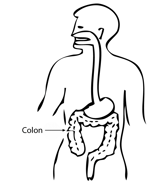Your child has been scheduled for a Colon motility study at Children’s Wisconsin on___________________ at 7:30 am.
Please stop at a Welcome desk for a badge and directions to Day Surgery on the 3rd floor of the hospital.
What is a colon motility study?
The colon is the large intestine. Motility means how something moves.
A colon motility study looks at how the muscles and nerves work together to move foods through the colon. If the colon does not move things well, it can cause constipation or diarrhea. The motility study measures pressures of how the muscles tighten (contract).
What needs to be done before the study?
The colon must be empty before the study can be done. You will be told how to prepare so that your child’s colon will be empty for the study. It is important that you follow the instructions you are given.
How is it done?
Your child will go to a special room to have the catheter put in. Family members are not allowed to be in the room while the catheter is being placed. However, you will be allowed to stay with your child during the study.
1. Your child will have an IV started in the hospital
2. Your child will be given medicine to help them sleep (anesthesia).
3. A special tube called a colonoscope is put in the rectum and goes into the colon. It has a light so the doctor can see inside the colon. This scope is used to place the motility catheter.
4. The motility catheter is a soft tube, about the size of a thick straw. The tube has sensors that measure pressure in the colon. After the doctor is done looking at the colon, the scope is removed. The motility catheter stays in the rectum until the study is done.
5. The catheter is taped to the skin of your child’s inner thigh. If your child is sensitive to any kind of tape, talk with the nurse when you schedule the study.
6. Once the catheter is in place, your child will stay in the Recovery Room until fully awake. The sleep medicine needs to wear off before the study starts for the test to be accurate. Pain or nausea medicines cannot be given because they may affect the test results
7. Your child will be taken to a hospital room. The catheter will be connected to a computer and the test will start. The study lasts about 5 to 6 hours:
- During the first two hours, we watch the pattern of the way the colon works. Your child can rest during this time.
- Then, your child will be given a high-fat meal that must be eaten within about 30 minutes. Your child will have choices about the foods they will eat. Let the motility nurses know if your child has any food allergies or intolerances. Please bring any special bottles or special formula your child uses.
- After your child is done eating the colon pattern is watched for one more hour.
- About one hour after the meal, a medicine is put into the tube to make the colon muscles contract. The colon pattern is watched until the study is done.
8. An x-ray of your child’s abdomen will be taken. This shows the doctor the position of the catheter at the end of the study. The x-ray will be done in your child’s room.
9. At the end of the study the catheter will be removed. Your child will be able to go home.
Will this test hurt?
The test does not cause pain. Your child may have some discomfort from having the tube taped to their thigh.
What else do I need to know?
Your child will need to stay in bed during the entire study. You may bring movies, toys, books or quiet games to help keep your child from getting bored and restless.
At least one parent should plan on staying with your child during the test. For safety reasons, please do not bring other children along. Grandparents or one or two other adults are welcome.
Some medicines that your child is taking may need to be stopped up to 7 days before the study.
Note: If you have not gotten a call from a motility nurse 7 days before your child’s scheduled study please call (414) 266-8490 (M-F between 8-4PM)
How will I get the test results?
Early results will be discussed with you after the test is done. It may take about a week for the doctors to review the test recordings and have final results. A letter will be sent to the doctor who ordered the test. You will be called if the final results differ from the early results.



